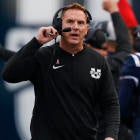The College Football Playoff Selection Committee has spoken: Alabama, Clemson, Ohio State and Washington are deemed the best. Now comes the much overanalyzed part of trying to understand what it means.
One theory: It doesn't matter who a team plays out of conference since Washington made it with the second-worst nonconference schedule. Except ... Ohio State is probably sitting at home without beating Oklahoma.
Another theory: Conference championships are meaningless since Penn State won the Big Ten and beat Ohio State yet got left out. Except ... 11 of the 12 playoff teams so far have won their conference and none of them had two losses like Penn State.
Frankly, while No. 5 Penn State and No. 6 Michigan certainly had cases to be made for inclusion, the committee's decision never seemed as difficult as many people made it out to be. Penn State and Michigan lost two games and thus lost their mulligans; Alabama, Clemson, Ohio State and Washington all had one or fewer defeats.
Based on how the rankings came out, the committee essentially had two debates: Washington vs. Penn State and Ohio State vs. Penn State. So let's analyze those debates.
Washington vs. Penn State
CFP committee chairman Kirby Hocutt suggested in his remarks to ESPN that this was the most significant debate. It paired a one-loss Pac-12 champion with a weak nonconference schedule against a two-loss Big Ten champion with a better schedule.
Hocutt said a number of factors were "spiritedly" discussed: Penn State had one more loss, Penn State wasn't competitive in one loss (a 39-point defeat to Michigan) and its other loss came against an 8-4 team (Pittsburgh, which is ranked in the top 25), and Penn State had a better strength of schedule.
"Had Washington had a stronger strength of schedule, I don't think the conversation and discussion would have been as difficult," Hocutt said. "We looked at key statistical categories, which translate to performance on the field each week -- statistical values that we see value in. Washington has the advantage. We talked about performance and what the coaches [on the committee] say over the course of 13 games, and Washington seemed to have the advantage."
Hocutt cited Washington's top-25 wins over Stanford, Utah and Colorado, and a victory over a Washington State team "playing with a lot of momentum" at the time. "They've played good teams and they've beaten some very good teams this college football season," Hocutt said of the Huskies.
Inevitably, the questions are again how athletic directors and coaches should schedule out of conference.
"I think it depends on where you see your football program at that particular time and in this particular year," said Hocutt, who is Texas Tech's athletic director. "But I would say you need to play a good schedule and win those games. And Ohio State, I think going on the road and winning against a top-10 Oklahoma team this year, shows that the selection committee respects that kind of schedule and those wins that come from those kind of nonconference games."
One theory: What if Penn State hadn't played and lost to Pitt? Would the one-loss Nittany Lions be in instead of one-loss Washington? Penn State coach James Franklin, who expressed disappointment but was gracious in getting left out, seemed to suggest that playing tough nonconference games shouldn't be a priority.
"What can you do to give yourself the best chance to win your conference championship and go undefeated?" Franklin told ESPN. "The Big Ten already doesn't allow us to play FCS or I-AA opponents, so strength of schedule has really been taken care of on its own by the fact we play nine conference games."
Penn State played Kent State (3-9), Pittsburgh (8-4) and AAC champion Temple (10-3) out of conference. Washington, which also played nine conference games, played Idaho (8-4), FCS Portland State (3-8) and Rutgers (2-10). Washington's schedule was created before Chris Petersen arrived at the school.
"It's easier said than done to get the schedule everybody is happy for and it's exactly what everybody needs," Petersen told ESPN. "These games are scheduled years out in advance and teams change and programs change, and we think we have a good matchup and it turns out to be not a good matchup, and someone you schedule you think isn't a good matchup and four years later it's a great matchup."
That's what happened with Oklahoma, which didn't expect Houston to be as good as it has been in the past two years. The Cougars beat the Sooners in Week 1. I'll say it again: Don't schedule nonconference games so far out. Do it in two-year windows so there's a better idea of how good or bad teams truly are.
"For years, [tough nonconference games] benefited us," Stoops told ESPN. "But it only works if you win, let's face it."
Kudos to Hocutt for being honest about why the Sooners were really left out: a suspect defense.
"We talked about how impressed the selection committee was on the offensive side of the ball, but they weren't as much of a complete team as those we were looking at in the top six this season," Hocutt said.
Ohio State vs. Penn State
This is the argument of, "What about conference championships and head-to-head?" Penn State won arguably the toughest conference in America, though conferences are so large and with such unbalanced schedules that a conference title isn't and aren't the end-all, be-all.
Penn State certainly had a case to be made.
"I think that's the hard part," Franklin said. "We sat in there as a team and listened to all of the points being made, and you could make arguments for and against so many different teams. Obviously, us being Big Ten champions and winning a game head-to-head, we felt like gave us a lot of value and the fact we're hot now."
Ohio State is the first playoff team that didn't win its conference. This happened periodically with non-champions in the BCS Championship Game too, so this isn't new.
"We come back to our protocol and that is identifying the four very best teams in college football," Hocutt said. "Conference championships [are] only piece, one metric of the conversation we have."
That the Big Ten champion is the first one to get left out of the playoff is ironic. It was Big Ten commissioner Jim Delany who pushed for the four best conference champions to be included, not the four best teams.
"We lost that election. That election was four years ago," Delany said Saturday. "We have to understand that elections happen, certain ideas are adopted and we're at a different place now. It's [the] four best teams. And conference championships are there to help sort that cluster out, as well as head-to-head, as well as strength of schedule."
Ohio State had three wins against top-10 teams (Oklahoma, Michigan and Wisconsin). Penn State had two wins against top-10 teams (Ohio State and Wisconsin), beating the Buckeyes on a blocked field goal return for a score. The reality is the Buckeyes did struggle at times during the season with their offensive line and playmakers not named Curtis Samuel.
Ohio State coach Urban Meyer told ESPN he doesn't think the Buckeyes would be in the playoff if they hadn't scheduled and beaten Oklahoma.
"I started thinking, someone on your group [at ESPN] said, 'Oklahoma would be in if they didn't play us or Houston,'" Meyer said. "I'm going to talk to [Ohio State AD Gene Smith] about that. Those are conversations where I think we need a lot of clarity about and that's true. Because Oklahoma isn't a good team, they're a great team."
Here's the real truth about the selection process nobody wants to hear: There's both frustration and value in having a flexible committee.
People want a uniform way for a one-sit-fits-all method to choose four teams who often play dramatically different opponents for various reasons. There is no uniformity from conference to conference and every season is different, so why wouldn't we want the committee to be flexible based on circumstances specific to each particular season?
There is no right or wrong answer. There is no formula spitting out answers from group-think poll voters and computers like in the BCS era.
The people wanted subjectivity. They got subjectivity.
















